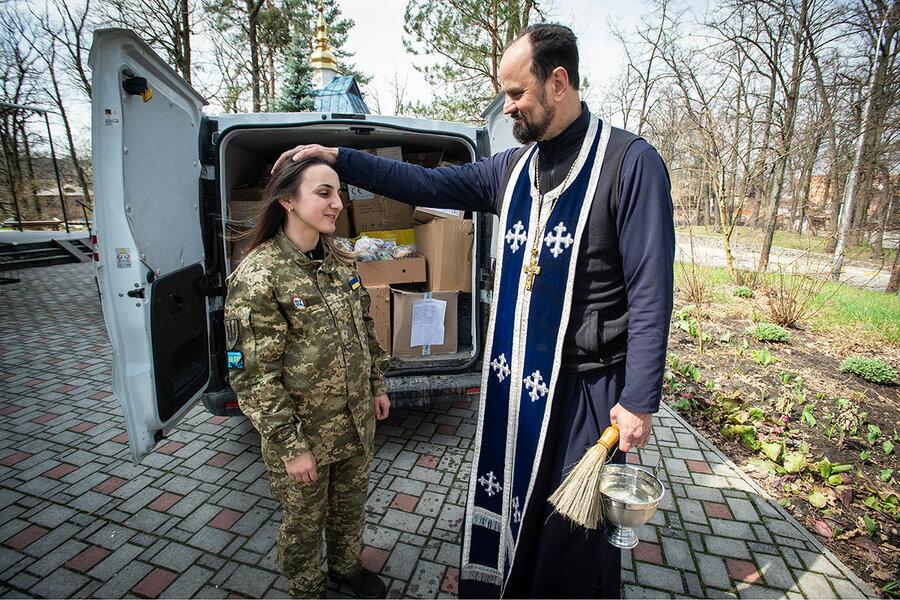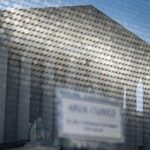
Beneath the gilded cupolas of his ornate Orthodox Christian church, the Rev. Andriy Kliushev had been seeking for years to convince his small Ukrainian congregation to end its centuries-old loyalty to Moscow.
Little did he know that it would be Russians themselves, in the form of brutal occupying forces who posted a sniper on the roof of his church in the leafy Kyiv suburb of Irpin, and detained and beat church volunteers for days, who would eventually push his flock away from the Moscow-based church.
In mid-May, Father Andriy’s congregation, after witnessing a variety of atrocities, voted to break with the Russian Orthodox Church and its Moscow Patriarch Kirill, a close ally of Russian President Vladimir Putin, who had firmly supported the war in Ukraine as a “metaphysical struggle.”
And last week, in an ecclesiastical earthquake that has rocked the Orthodox world, the leadership of Ukraine’s Moscow-loyalist church followed suit en masse, declaring the war “a violation of God’s commandment ‘Thou shalt not kill” and formally breaking its allegiance to Patriarch Kirill.
The schism is a striking result of Russia’s invasion of Ukraine, which has eroded the centurieslong bond between the leadership of the Russian Orthodox Church – which counts 100 million believers among its ranks – and its adherents in Ukraine and elsewhere, who have been repulsed by the war.
Shaking off Stockholm syndrome
For the faithful at Father Andriy’s church of St. Mikolay, where a painting of the saint above the church door is disfigured by a bullet hole in the eye, the choice of independence from Moscow was not an easy one to make.
“Some people have Stockholm syndrome. They get beaten, their houses are destroyed, and they still support Kirill; I am shocked,” says Father Andriy, a tall priest with a welcoming smile, speaking in his church rich with the scent of burning candles and incense.
It took weeks of debate, even after the scale of destruction the Russians had wrought became clear, before church members would take the plunge, turning their back on the Moscow church that had enjoyed jurisdiction over them since 1686.
In doing so, they turned their back on an entire worldview.
When making its case for war, Moscow claims that Ukraine is an integral and brotherly part of a greater Russkii Mir, or “Russian World,” the historical and spiritual center of a neo-imperial project to bring together Russian speaking peoples and reunite former Soviet lands.
For President Putin – who proclaims a personal post-Soviet religious awakening – the loss of Ukrainian believers will be an especially painful casualty of Russia’s war, says the Rev. Anton Fomenko, a historian at the Kyiv National Pedagogical University and a Roman Catholic priest, who wrote his Ph.D. on the Russian Orthodox Church.
“They greatly want to have communication with Kyiv, because Kyiv is … the motherland of Russian Orthodoxy,” says Mr. Fomenko. “Here in Kyiv was the baptism of Slavic tribes that became Christians. It’s like when you have a tree; this tree has roots. If you cut the roots, the tree will die.”
Putin recalls Cain
The invasion has been a “catastrophe” for Moscow loyalists, he says. Such believers “felt after the beginning of the war that all their worldview has broken. They don’t know what to do now.”
With the collapse of the Soviet Union in 1990, the Ukrainian branch of the Russian Orthodox Church was granted semi-autonomy by Moscow, and renamed the Ukrainian Orthodox Church – Moscow Patriarchate.
Since Russia seized Crimea and supported separatists in the Donbas in 2014, however, there has been a growing movement in Ukraine for a separate ecclesiastical body. In 2019, the Orthodox Church of Ukraine was formed and granted “autocephaly” by Patriarch of Constantinople, Bartholomew, the spiritual leader of Eastern Orthodoxy – a move rejected as illegal by Moscow.
The Ukraine invasion reignited a desire for full independence. When the war began, the leader of the Orthodox Church of Ukraine, Metropolitan Epiphanius, said the “spirit of the antichrist operates in the leader of Russia,” and compared President Putin to Hitler.
Even Metropolitan Onufriy, the head of the Moscow-loyalist church in Ukraine, denounced the invasion as a “repetition of the sin of Cain, who killed his own brother out of envy.”
Blessing both sides
Navigating this minefield have been parish priests, often caught between the weight of Orthodox canonical tradition and the incendiary politics of the war. One man who exemplifies this dilemma is the Rev. Petro Pavlenko, a gray-bearded Orthodox priest always loyal to the Moscow patriarchate, who has big hands and wears a large cross around his neck.
“This war is a big mistake. It should not happen – it’s a sin,” he says, speaking in his icon-plastered church in Hostomel, the suburb north of Kyiv where Russian paratroopers landed at the military airport at the start of the war.
Father Petro says he supported and blessed Ukrainian troops before they were forced to withdraw, and even spray-painted the words “never give up” on a nearby shop, to encourage them.
But he then risked controversy by also blessing advancing Russian tanks and troops, an action that he says aimed to bring peace, so they would “get back to their homes and motherland,” but instead prompted local suspicions.
“I blessed [the Russians] and I asked for the war to end,” says Father Petro. “I told them, ‘You don’t have to kill Ukrainians. We are brothers.’”
Father Petro says he received threats after Russian forces withdrew. He spray-painted anti-war messages on buildings around his Sviato-Pokrovska church, and on a side door wrote the words “We’re peaceful Orthodox people. Don’t touch our church.”
“We are Ukrainian. We love Ukraine. We pray for victory,” says Father Petro, adding that the war is “breaking the laws of God.” Still, he avoided criticizing Patriarch Kirill’s support for the war as a battle against “sin,” and his sympathy for President Putin’s concept of a “Russian World.”
A war for existence
“Russia has an imperial nationalism, and there is no place for Ukrainians as a nation,” says Archpriest Andriy Dudchenko, a doctor of theology at the Kyiv Orthodox Theological Academy. “In their view, the Ukrainian people and their land is part of Russia.”
Still, the war has backfired on any Kremlin aims to bring Ukrainian believers closer.
“What I see from my fellow priests … now they understand it is impossible to be under the Moscow patriarchate since the war started,” says Father Andriy. “Now they understand that Russkii Mir is not reality; it is a mental construct to enslave Ukrainians.”
That message was clear at Easter, when Ukrainian Orthodox priests blessed soldiers on the front lines, buried the dead, and accused Russia of breaking divine law.
In Kyiv, scores of Ukrainians lined up outside St. Volodymyr’s Cathedral, waiting to be sprayed with holy water.
“Russia chose not to develop, but to kill its neighbors,” the Rev. Oleksandr Shmurygin of the Ukrainian church told believers, as he doused them. “This suffering that we are going through will be like gold passing through fire. This is caused by the freedom we have chosen to follow.
“This is a war for the existence of each one of us. Don’t forget that.”
Reporting for this story was supported by Oleksandr Naselenko.
Related stories
Read this story at csmonitor.com
Become a part of the Monitor community




